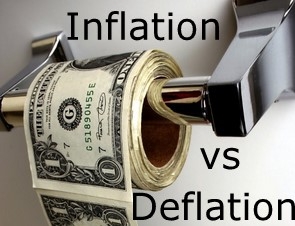
By Bernard Hickey
Academic debates about history and economics send most people to sleep very quickly.
It's like Mogadon without the drugs.
But what if you could be more confident about fixing or floating your mortgage if you knew who would win these debates?
This issue of the future of interest rates makes the history of inflation vs deflation and what might happen next in the global economy crucial for millions of New Zealanders with term deposits and mortgages. We have over NZ$190 billion of mortgages and over NZ$100 billion of term deposits that ride on the outcome.
Last week's increase in the Official Cash Rate (OCR) cast this debate in a bright spotlight. Reserve Bank Governor Alan Bollard lifted the OCR by 25 basis points to 3% and said he would lift it again soon. But he also said future increases in the OCR would not be as fast or as high as he had previously forecast because of a softening of growth in the global economy and the local economy.
Bollard forecast on June 10 that the OCR was likely to rise to around 5.75% by late 2012 as he withdrew stimulus from the economy to control inflation pressures building under the surface. The Reserve Bank's projections for the 90 day bill rate implied most of that increase would happen over the next year. Now he is saying he may not have to raise it quite so high or so fast. Economists are now saying Bollard may hike by a further 50 basis points to 3.5% before pausing in December. Some suggest he may eventually raise it to 5% rather than the 5.75% previously suggested.
That would mean floating mortgage rates top out at around 8% in late 2011 rather than around 9%. That's important for those choosing to float their mortgage rather than fix it. Given the banks are likely to increase their floating mortgage rates to around 6.2% over the next week or so, many will be wondering if the two year fixed rates of around 7% make financial sense over the two years.
It is even possible those longer term fixed rates could fall again in the coming weeks to around 6.8% given wholesale interest rates fell around 10 basis points after the OCR announcement. That would make the equation even closer and the decision even trickier.
This is where the debate about deflation and inflation becomes crucial. If you believe that eventually all the money printing going on in America and Europe will eventually spark inflation as it did during the 1920s and 1970s, then you would expect the OCR to rise quickly next year and make the fixed deal more attractive.
If you think the headline inflation spike coming in New Zealand later this year because of the GST increase, the ACC levy hikes and the ETS costs will cause longer term inflation then the fixed deal looks even more attractive.
If you believe that the world is in for long period of very slow growth characterised by grinding debt deleveraging and the sort of stagnation experienced in Japan in the last 20 years then you would expect the OCR to stay lower for much longer and floating rates become more attractive.
So the debates about the Weimar Republic hyperinflation of the 1920s in Germany vs the Japanese deflation of the 1990s suddenly become interesting.
They are really debates about fixing versus floating.
Your view? I welcome your thoughts.
1 Comments
Check out the recent rise in inflation expectations.
http://www.interest.co.nz/images/inflation-expectations.gif
There is a risk that these 'one off' spikes in inflation turn into something more permanent
cheers
bernard

We welcome your comments below. If you are not already registered, please register to comment
Remember we welcome robust, respectful and insightful debate. We don't welcome abusive or defamatory comments and will de-register those repeatedly making such comments. Our current comment policy is here.